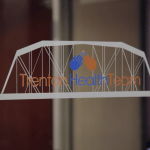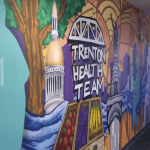Hi Judith, please introduce yourself.
I’m Judith Hamilton with the Trenton health team as their Project Dulce Peer educator I go into the community and share my journey of diabetes with those in the community with diabetes. I give them some insight into what they should be doing with the understanding of their social determinants. There may be some limitations, and together we can try to work out how to get around those limitations.
How does your role help patients who may face challenges managing a chronic condition like diabetes?
First of all the onset of type 2 diabetes is middle age and up and I fit that mold. I’ve had diabetes now for about 35 years I know the pitfalls, I know the denial stages, I know the disease state, and I have been certified through several agencies just to understand the medical background of diabetes. I understand the community and what’s in the community and I am a face that they can see themselves in. Also, I’m without a white coat so it becomes more like a support group. This is how I lend myself to the community because I walk the journey with them.
support group. This is how I lend myself to the community because I walk the journey with them.
How is Trenton Health Team’s approach to diabetes education different from what patients may experience in other health organizations?
Trenton health team is not a hospital or clinic and it takes that white coat fear away. We’re a community organization and if indeed we have participants lacking in one area perhaps as a community organization. We have a farm program where we provide fresh fruits and vegetables two months at a time. Why? Because uh the community is without grocery stores and fresh foods. This is one of the programs that the Trenton Health Team has been set up to help these folks to eat right and then we apply for physical activity programs and different classes on cooking and anything that would involve and help with diabetes.
What are the factors in your community that currently impact people’s health, especially those living with diabetes?
Housing. Transportation. I’ve heard stories where patients will get their food vouchers but then they have to spend $8 to go to the grocery store and then $8 to get back. That’s $16 they could have purchased good healthy food. In the  neighborhoods, patients need to get out there quickly and in daylight because nightfall may be dangerous. Education. Employment. Income. Some people get out early in the morning for physical exercise some in the evening but due to the environment that may not be possible. Language and literacy skills. Those needs may not be met and those are just a few of the factors that impact the folks in the community.
neighborhoods, patients need to get out there quickly and in daylight because nightfall may be dangerous. Education. Employment. Income. Some people get out early in the morning for physical exercise some in the evening but due to the environment that may not be possible. Language and literacy skills. Those needs may not be met and those are just a few of the factors that impact the folks in the community.
How has COVID-19 changed your role at Trenton Health Team?
At the onset of COVID, we had to figure out how to get this information to the people in the community. In the beginning, I would go to senior houses senior centers, churches, and things of that nature and they were in-person classes. So, COVID shut us down and we had to figure out how to continue the Dulce program. I had to learn how to operate this thing called the computer. I’m of the age group where it’s very difficult for us to conceptualize all of this and then share it with someone else. So, that was a struggle, fortunately, worked with some dynamic young folks that took me through that process. We got over that one hump then we realized that the folks that I’m trying to communicate with did not have the devices needed. We decided that we would find funding to get some handheld devices for these folks. We got over this second hump (actually third) and then we realized that there wasn’t wi-fi or if wi-fi was available it was thirty to fifty dollars a month. These people just did not have it in their budget so we had to figure out different alternatives. Once we were well into covid some of the libraries started opening up we have one Starbucks in the community that would allow our folks to come in for one hour a week where I provided a support group. But the positive part is we were able to get the participants enrolled and I learned a bit more about the computer.
What do we need to do moving forward to address the medical and social needs of patients living with diabetes? What are some of the problems that need urgent attention?
Health care reform. I wrote it down. New policies addressing health disparities. Just teaching people basic lifestyle changes. If we could master some of the political issues and get people being treated equally in health care truly think we can control diabetes. Because it’s increasing it’s not decreasing. It can wipe out whole pockets of people So if we address some of these things I know there will be a great improvement.
